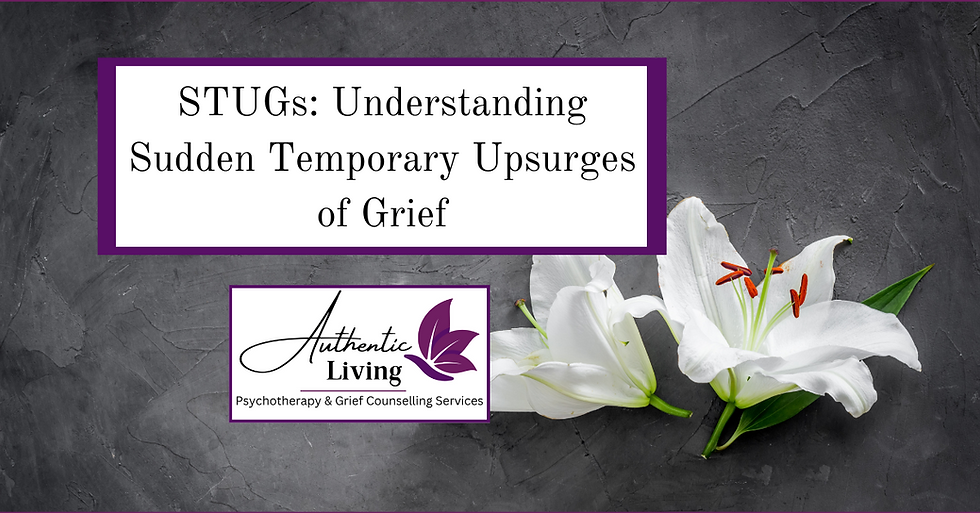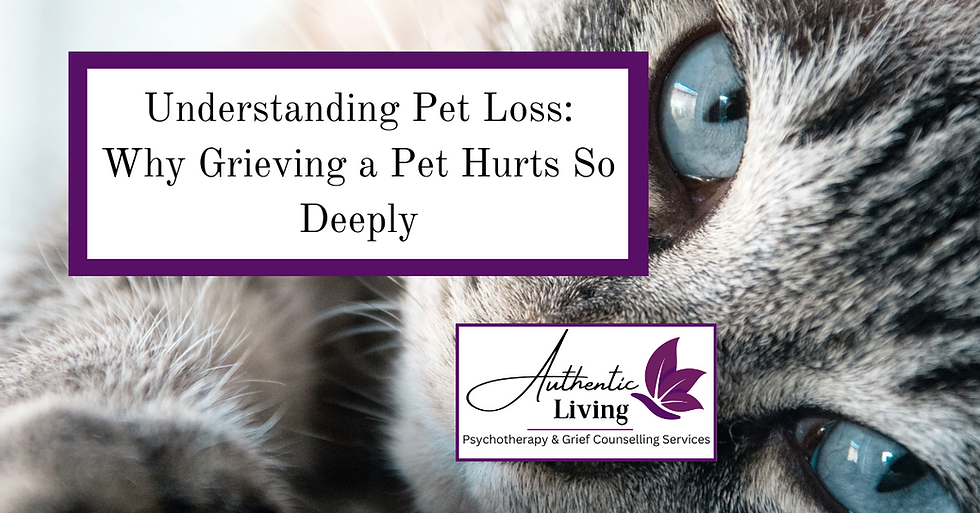STUGs: Understanding Sudden Temporary Upsurges of Grief
- Aug 19, 2025
- 3 min read
Grief is not a straight line. It often comes in waves, sometimes gentle and sometimes overwhelming. One of the most common experiences people have while grieving is what’s known as a STUG—a Sudden Temporary Upsurge of Grief. If you’ve ever been going about your day, maybe even feeling steady, only to be hit with a powerful rush of emotion that feels almost as raw as the beginning of your loss, you’ve likely experienced a STUG.
At Authentic Living London, where we specialize in grief counselling, we see STUGs as a natural and meaningful part of the grieving process. If you’ve ever searched for a grief therapist near me or grief therapist London Ontario, you may already be looking for answers to why grief feels so unpredictable. This blog will help you understand what STUGs are, why they happen, and how you can navigate them with care and compassion.

What Are STUGs?
The term STUG stands for Sudden Temporary Upsurge of Grief. These are intense waves of grief that may show up unexpectedly, even long after a loss. They can be triggered by something obvious, like a song, a smell, a photo, or an anniversary. But sometimes, they seem to appear without any clear reason at all.
A STUG can feel like:
A rush of sadness or longing that feels as strong as the first days of grief
A flood of tears or the inability to stop crying
A feeling of emptiness, shock, or disbelief
A physical reaction, like tightness in the chest or heaviness in the body
While STUGs may feel alarming, they are a normal part of grief.
Why Do STUGs Happen?
STUGs occur because grief lives in us; it’s not something that “goes away” on a timeline. Over time, the intensity may soften, but the love and bond with the person we’ve lost continues. Triggers, both conscious and unconscious, can awaken that connection, bringing up fresh waves of emotion.
Some common reasons for STUGs include:
Anniversaries and milestones: Birthdays, holidays, or life events that highlight your loved one’s absence
Sensory reminders: Smells, sounds, or objects connected to the person you’ve lost
Unexpected moments: Everyday life experiences that highlight the gap your loved one left
Internal changes: Your own personal reflections, growth, or stress levels making grief resurface
Far from being a setback, STUGs show the depth of your connection and the ongoing role your loved one plays in your life.
What Do STUGs Mean?
Many people fear that experiencing a STUG means they aren’t healing, or that they’re “back at square one.” This isn’t true. STUGs are not a sign of regression. They’re a sign that your grief is alive, and that your bond with your loved one continues to matter.

They can mean:
Your grief is evolving, not disappearing
Love and memory are still deeply present
Healing isn’t about “getting over it,” but about finding ways to carry your loss with you
How to Handle STUGs
STUGs can feel overwhelming, but they are survivable. Here are ways to handle them with care:
Allow the wave – Don’t fight the grief when it shows up. Cry if you need to. Sit with the sadness. Give yourself permission.
Ground yourself – Focus on your breath, notice your surroundings, or place your hand on your heart to remind yourself you are safe in this moment.
Talk about it – Share with a trusted friend, family member, or a grief therapist. Saying it out loud helps release the weight.
Create rituals – Light a candle, write in a journal, or engage in a practice that honours your loved one when a STUG arises.
Offer compassion to yourself – Remind yourself that STUGs are a natural part of grief and not something to “fix.”
How Grief Counselling Can Help with STUGs
We don’t try to cure grief; we provide care, compassion, and tools to help you navigate it. A grief therapist can:
Normalize the experience of STUGs so you don’t feel alone or “broken”
Help you develop strategies for managing unexpected waves of grief
Offer space to honour your loss without judgment or pressure
Support you in carrying your grief in a way that feels authentic to you
Finding Support at Authentic Living London
At Authentic Living London, we believe grief doesn’t need to be fixed; it needs to be supported. If STUGs are making your grief feel unpredictable or unbearable, you don’t have to face them alone. Our therapists are here to walk alongside you, whether you’re dealing with fresh grief or waves that resurface years later.
If you’ve been looking for grief counselling or a grief therapist in London Ontario, we invite you to reach out and book a free 15 minute consultation today. Together, we can create a safe space for your grief to be honoured and for you to find ways to live fully while carrying the love you’ll always hold.










Comments